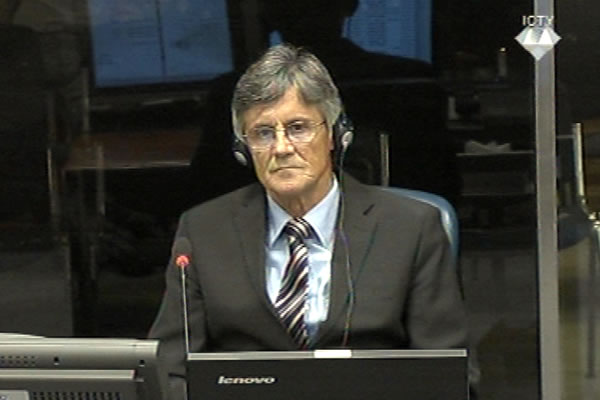Home
DOCUMENTS FULL OF ‘ERRORS’
War time president of the Ilijas Crisis Staff Ratko Adzic has testified at the trial of Ratko Mladic that there was no plan to expel Muslims and Croats. According to Adzic, Muslims and Croats left the municipality as ‘a result of a difficult and chaotic situation’, not under duress. Adzic has also denied that he had any authority over the Ilijas Brigade. Documents contradicting Adzic’s claims are full of errors, he has told the judges
 Ratko Adzic, defence witness at Rako Mladic trial
Ratko Adzic, defence witness at Rako Mladic trial Ratko Adzic testified at the trial of his namesake Ratko Mladic. Adzic is the war-time president of the Serb municipality of Ilijas and its Crisis Staff. He went on to become the interior minister of Republika Srpska. In his statement to the defense Adzic said that ‘the SDS implemented a policy designed to defend Serbs against the threats of genocide and ethnic cleansing made by Muslims and Croats’ organized by the SDA in the Patriotic League and Green Berets.
In Adzic’s words, in the first months of the war in the Ilijas area there was a ‘peace agreement’ in effect. It lasted until a Muslim offensive launched on 3 May 1992. After the fighting began, he ‘tried to ensure the freedom of movement’ for Croat and Muslim civilians, said Adzic. The witness claimed that there was no plan to expel Muslims and Croats. According to Adzic, Muslims and Croats left the municipality as ‘a result of a difficult and chaotic situation’, not under duress.
Given Adzic’s position as the Crisis Staff, presiding judge Orie wanted to know if the Serb military forces in that municipality had been under his command until the formation of the VRS in May 1992. Adzic told him that he only had the Territorial Defense under his command. A while later, in the cross-examination the witness said that he also had the Serb police under his command.
The witness also claimed that he had no authority over the Ilijas Brigade, established in late May 1992 except ‘in terms of making arrangements and giving advice to the command’. Prosecutor Bibles then showed Adzic a letter of 12 June 1992, in which Adzic asked for weapons from RS president Radovan Karadzic to ‘defend and clean up the terrain’. Adzic signed the letter as the commander of the ‘VSN’. When the judge asked Adzic what the acronym stood for, Adzic explained it meant ‘military forces’, i.e. the Territorial Defense.
The prosecutor confronted Adzic with a document in which several Muslims were granted permission to leave Ilijas. That document, from late June 1992, also bore the Ilijas Brigade seal and Adzic’s signature as the ‘commander’. The witness claimed that at that time he was just the municipality president and was signed as commander ‘by mistake’. Adzic said that the Red Cross issued permits to citizens who wanted to leave. He, Adzic explained, intervened only in ‘exceptional situations’.
In the cross-examination, Adzic was confronted with a document of 15 May 1993, which appointed the Prijedor police chief Simo Drljaca a member of the commission set up to investigate genocide against the Serb people. From January to July 1993, Adzic was the RS police minister. According to Adzic, that document too was ‘full of errors’. When he was minister, Drljaca was appointed the chief of the MUP Information Department but this was done just on paper: Drljaca never assumed his duty.
The judges noted that Adzic had avoided giving direct answers several times, or gave ‘imprecise’ answers. If he continued to do so, the judges warned, his entire evidence could be rejected. At the prosecutor’s request, the witness was read Rule 90 E, which grants witnesses the right not to answer potentially incriminating questions.
After Ratko Adzic completed his evidence, the trial continued in closed session.
Linked Reports
- Case : Mladic
- 2014-08-25 MLADIC’S DEFENSE: WE DON’T WASTE COURT TIME
- 2014-08-25 DID SERBS ASSIST CROATS FOR HUMANITARIAN OR OPPORTUNISTIC REASONS?
- 2014-07-24 DOUBLE GENOCIDE REMAINS IN MLADIC’S INDICTMENT
- 2014-08-27 PROSECUTION CALLS FOR OPPORTUNITY TO PRESENT TOMASICA EVIDENCE
- 2014-08-28 NO POINTS FOR PRESENTATION
- 2014-09-01 EVIDENCE ON DEPLYOMENT OF BH ARMY TROOPS IN SARAJEVO
